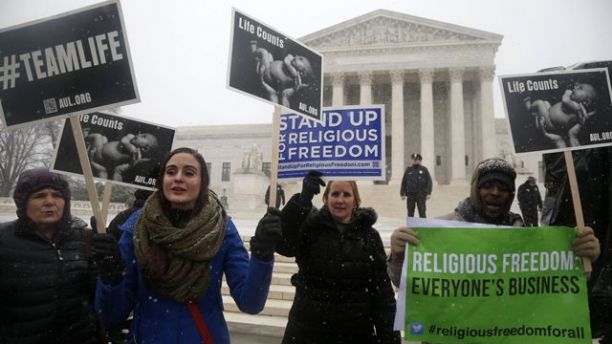

The Supreme Court ruled Monday that Hobby Lobby and other closely held corporations do have a right to religious liberty and the freedom of conscious. The 5 -4 decision marks the first time the court has ruled that for-profit businesses can cite religious liberty as an objection to overreaching federal laws.
The case was the highest profile case involving ObamaCare, or the Affordable Care Act, since the Supreme Court upheld the law when Chief Justice John Roberts rewrote the statute to declare the “shared responsibility payment” was a tax.
Justice Samuel Alito wrote the 49-page majority opinion in this latest ObamaCare case, while the court’s four liberal justices dissented, including Ginsberg’s 35-page attack on the majority opinion and a separate dissent from both Breyer and Kagan.
The court held that closely held corporations cannot be required to provide contraception coverage under ObamaCare. The decision means the Religious Freedom Restoration Act, or RFRA, applies to regulations that govern the activities of closely held for-profit corporations, including Conestoga, Hobby Lobby and Mardel.
“Our decision should not be understood to hold that an insurance-coverage mandate must necessarily fall if it conflicts with an employer’s religious beliefs,” Alito wrote in the decision.
The Supreme Court said that the government failed to show that the mandate is the least restrictive means of advancing its interest in guaranteeing cost-free access to birth control. Justice Kennedy’s concurring opinion stated that the government could pay for the coverage itself, so that women receive it.
The opinion now means that the highest court in the United States takes the position that corporations — including for-profit corporations — are in fact “persons” for purposes of RFRA. However, on the question of whether corporations can have a religious “belief” within the meaning of RFRA, the court limited its holding to closely held corporations, leaving for another day the question of whether larger, publicly traded corporations also have religious beliefs.
BACKGROUND
Nearly 50 businesses have sued over covering contraceptives, but only a few objected to paying for all forms of birth control. Hobby Lobby, and the other companies involved in the case, were willing to cover most methods of contraception. However, as long as they can exclude drugs or devices that the government says may work after an egg has been fertilized, they feel there is little conflict with their faith.
The largest company among them was Hobby Lobby Stores Inc., owned by the Green family. They said their “religious beliefs prohibit them from providing health coverage for contraceptive drugs and devices that end human life after conception.”
In fact, all the companies in this case, and their backers, argued that a 1993 federal law on religious freedom extends to businesses. On the other hand, the Obama administration argued it’s not just about birth control, and that a Supreme Court ruling in favor of the businesses could undermine laws governing immunizations, Social Security taxes and minimum wages.
Oklahoma City-based Hobby Lobby has more than 15,000 full-time employees in more than 600 crafts stores in 41 states. The Greens are evangelical Christians who also own Mardel, which is a Christian bookstore chain.
The most damning journalistic sin committed by the media during the era of Russia collusion…
The first ecological study finds mask mandates were not effective at slowing the spread of…
On "What Are the Odds?" Monday, Robert Barnes and Rich Baris note how big tech…
On "What Are the Odds?" Monday, Robert Barnes and Rich Baris discuss why America First…
Personal income fell $1,516.6 billion (7.1%) in February, roughly the consensus forecast, while consumer spending…
Research finds those previously infected by or vaccinated against SARS-CoV-2 are not at risk of…
This website uses cookies.